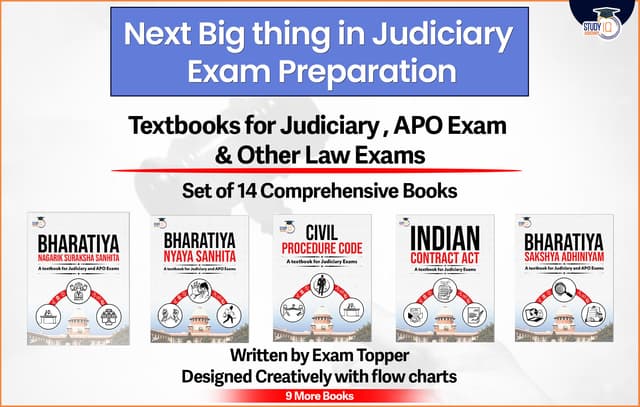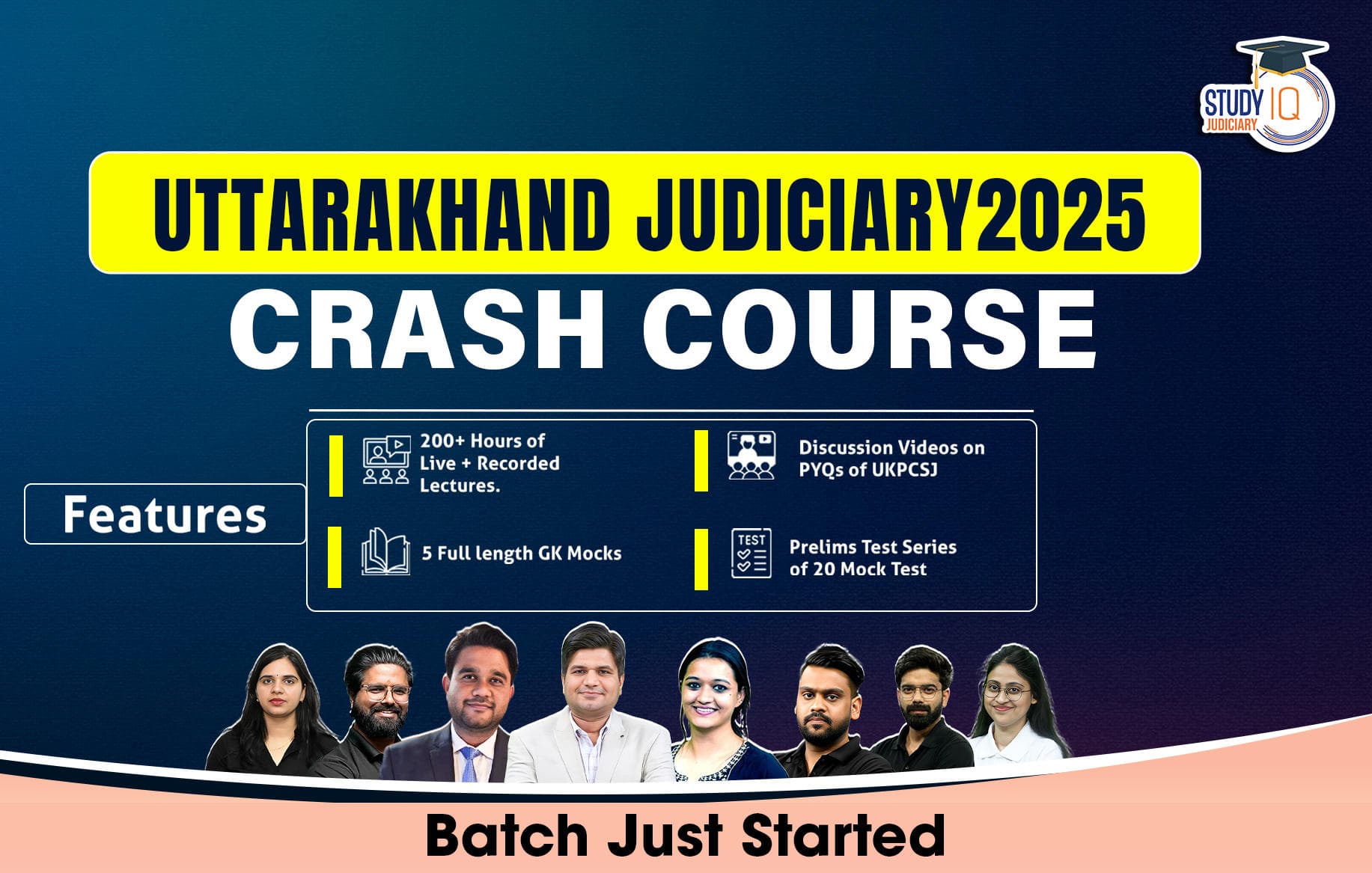Table of Contents
Land acquisition in India is a contentious topic that intersects development, displacement, constitutional rights, and social justice. The equilibrium between the State’s obligation to promote development and the individual’s right to sustenance remains a substantial legal and ethical challenge. The Supreme Court of India recently clarified that rehabilitation is not a basic right, even when property is acquired for public purposes under legal authority.
Land Acquisition and the Indian Constitution
The Principle of Eminent Domain
- In India, land acquisition is predominantly regulated under the doctrine of eminent domain, permitting the State to buy private land for public purposes, contingent on the provision of equitable compensation.
- This principle is embodied in Entry 42, List III (Concurrent List) of the Seventh Schedule of the Indian Constitution and is implemented through legislative frameworks such as the Right to Fair Compensation and Transparency in Land Acquisition, Rehabilitation and Resettlement Act, 2013 (LARR Act).
Article 300A and Property Rights
- The right to property, previously a basic right under Article 31, was struck down by the 44th Constitutional Amendment Act of 1978 and is now a constitutional legal right under Article 300A, which stipulates: “No person shall be deprived of his property save by authority of law.”
- This amendment substantially transformed the framework of land acquisition in India, granting greater discretion to the State while underscoring the importance of procedural compliance.
Article 21 and the Right to Livelihood
- Article 21 of the Indian Constitution ensures the right to life and personal liberty, and its broad interpretation by the judiciary has encompassed the right to livelihood. The latest Supreme Court judgment emphasises that the right to livelihood under Article 21 cannot be claimed to need rehabilitation or alternative land unless explicitly stipulated by statute or policy.
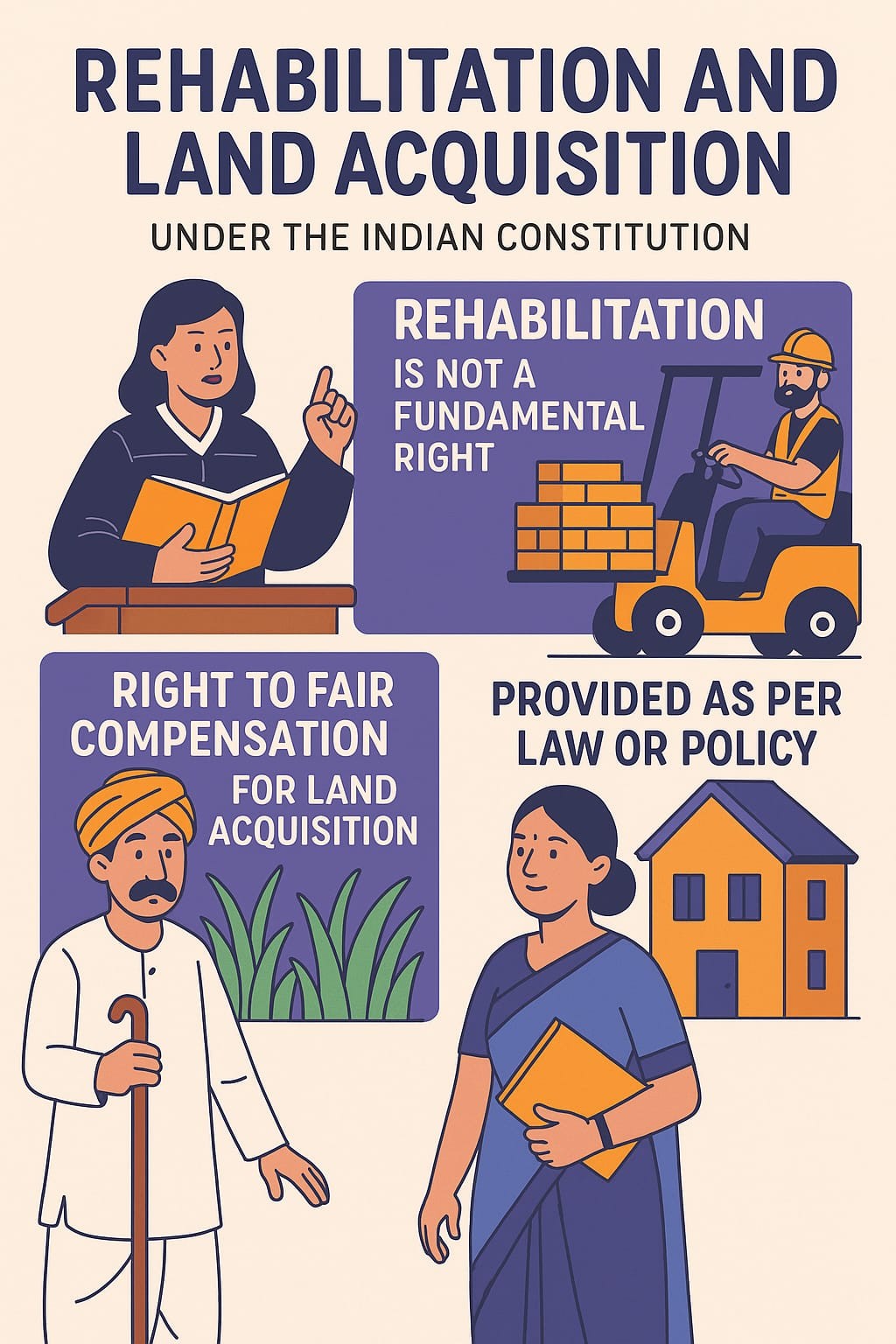
Supreme Court’s Verdict: Rehabilitation Not a Fundamental Right
- The Supreme Court, in a decision rendered by Justices B. Pardiwala and R. Mahadevan, determined that:
- “In cases of land acquisition, the plea of deprivation of right to livelihood under Article 21 of the Constitution is unsustainable.”
- “When land is acquired for any public purpose, the person whose land is taken away is entitled to appropriate compensation in accordance with the settled principles of law. It is only in the rarest of the rare cases that the government may consider floating any scheme for rehabilitation of the displaced persons over and above paying them compensation in terms of money.”
- This ruling originated from petitions submitted by landowners in the Kaithal district, Haryana, who sought residential plots pursuant to a 1992 policy following the acquisition of their land for public reasons. The Court elucidated:
- Compensation constitutes a legal right, whereas rehabilitation does not.
- Rehabilitation measures are dictated by policy and are not enforceable rights unless codified in legislation.
- The State is not obligated to furnish alternative lands or houses unless mandated by a binding legal framework.
- The bench warned against populist welfare initiatives that complicate the purchase procedure, resulting in prolonged litigation and unrealistic expectations.
Significance and Recent Developments in Rehabilitation Law
The LARR Act of 2013: A Transformative Change
- The enactment of the LARR Act, 2013, is a major advancement in land acquisition law, which stipulates:
- Conduct a Social Impact Assessment (SIA) before acquisition.
- Consent provisions for corporate and public-private partnership initiatives.
- Rehabilitation and Resettlement (R&R) is a fundamental component of acquisition.
- Higher compensation and safeguards for impacted families.
- The Supreme Court ruling clarifies that the right to rehabilitation cannot be deemed a fundamental right under such statutes unless acknowledged by the Constitution or judicial interpretation.
Judicial Equilibrium of Development and Rights
- The Indian judiciary has traditionally engaged actively in land acquisition controversies.
- Cases such as Narmada Bachao Andolan v. Union of India (2000), State of M.P. v. Narmada Bachao Andolan (2011), and Amarjit Singh v. State of Punjab (2010) illustrate judicial apprehensions regarding displaced individuals, while also confirming that the judiciary will refrain from legislating rehabilitation rights in the absence of statutory provisions.
The Role of the Judiciary: Interpretative Guardrails
- The judiciary serves as a constitutional guardian in land acquisition issues. Although it has protected rights under Article 21 in various instances, it has also demonstrated restraint when legislative intent or statutory clarity is absent.
- The Court noted in the current case that:
- “Beneficial measures taken by the government are guided only by humanitarian considerations of fairness and equity… not legal entitlement.”
- It cautioned that excessive judicial expansionism in this domain could undermine government boundaries and foster unreasonable expectations.
- The court determined that the landowners may only pursue a remedy under the Haryana Urban Development Authority (HUDA)’s amended 2016 policy, which regulates the allocation of alternative plots for oustees at prevailing rates and conditions.
- The petitioners were allotted four weeks to submit their applications under the 2016 program, and the relevant authorities were instructed to process the requests accordingly.
- The court instituted stringent safeguards to avert the exploitation of the rehabilitation initiative and the establishment of land cartels.
- It instructed HUDA and the state of Haryana to guarantee that “land grabbers or any other malefactors do not establish a cartel to exploit the allotment of plots.”
- Moreover, it stipulated that the allocation of plots must not be regarded as a monetizable asset and instituted a five-year lock-in period on any property transfer.
- The allottee is prohibited from transferring the plot to any third party without the consent of the relevant authority, and under no circumstances within five years from the date of allotment.
International Relevance and Human Rights Perspectives
United Nations and the Right to Adequate Housing
- The International Covenant on Economic, Social and Cultural Rights (ICESCR), of which India is a signatory, acknowledges the right to an adequate standard of living, encompassing housing and livelihood. The United Nations’ Basic Principles and Guidelines on Development-Based Evictions and Displacement (2007) advocate for States to:
- Prevent arbitrary displacement.
- Guarantee sufficient compensation and relocation.
- Offer legal recourse and protections.
- Nonetheless, these ideas lack enforceability under Indian law unless integrated into native statutes.
Balancing Sovereignty and Responsibilities
- India has consistently maintained a balance between sovereignty over natural resources and its obligations to human rights.
- The Supreme Court’s ruling emphasises that although international norms may inform policy, they do not supersede constitutional requirements or legislative constraints.
Conclusion
- The Supreme Court’s decision that rehabilitation is not a fundamental right clarifies the intricate relationship among constitutional rights, legislative entitlements, and state actions.
- The Court recognises the ethical necessity of humanitarian resettlement but distinctly separates legal rights from policy-based assistance.
- This ruling, albeit limited in its immediate effects, aims to set realistic expectations, prevent litigious abuse, and maintain the integrity of governance structures in land purchase procedures.
- In the future, any effort to establish rehabilitation as an enforceable right must occur through legislative action rather than judicial interpretation.
- Simultaneously, the State’s ethical obligation to assist the displaced persists, especially within a constitutional democracy dedicated to justice, dignity, and equality.

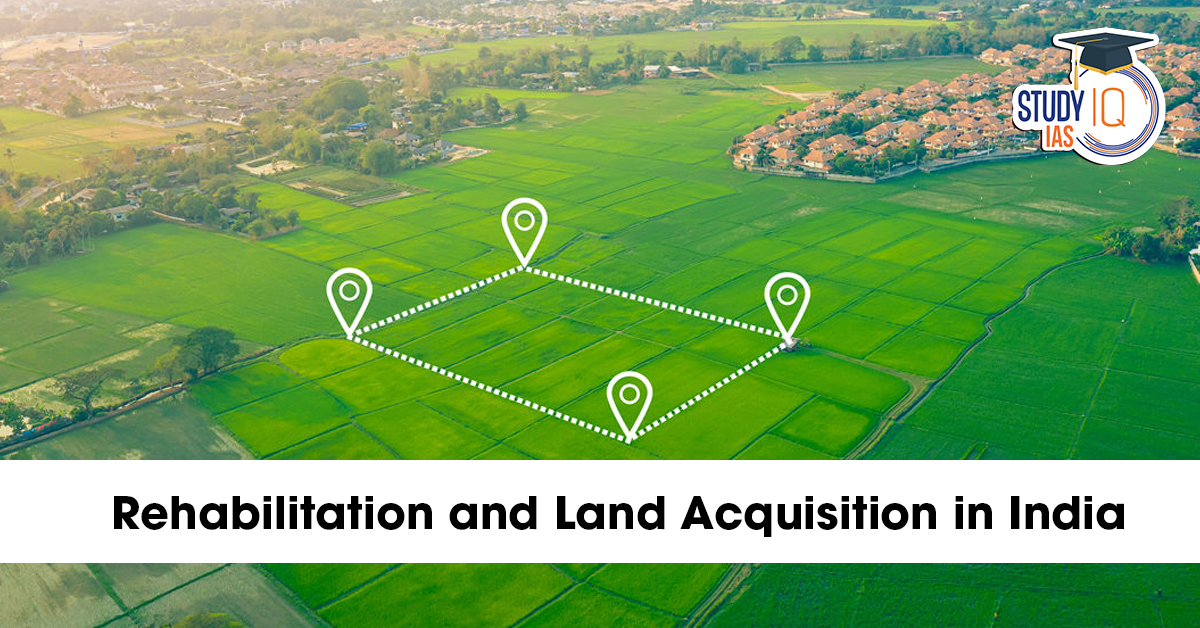
 A Choice Before India: Rule of Law or Ru...
A Choice Before India: Rule of Law or Ru...
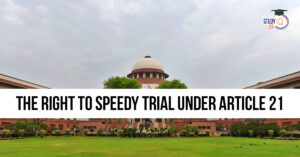 The Right to Speedy Trial Under Article ...
The Right to Speedy Trial Under Article ...
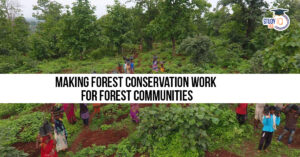 Making Forest Conservation Work for Fore...
Making Forest Conservation Work for Fore...






